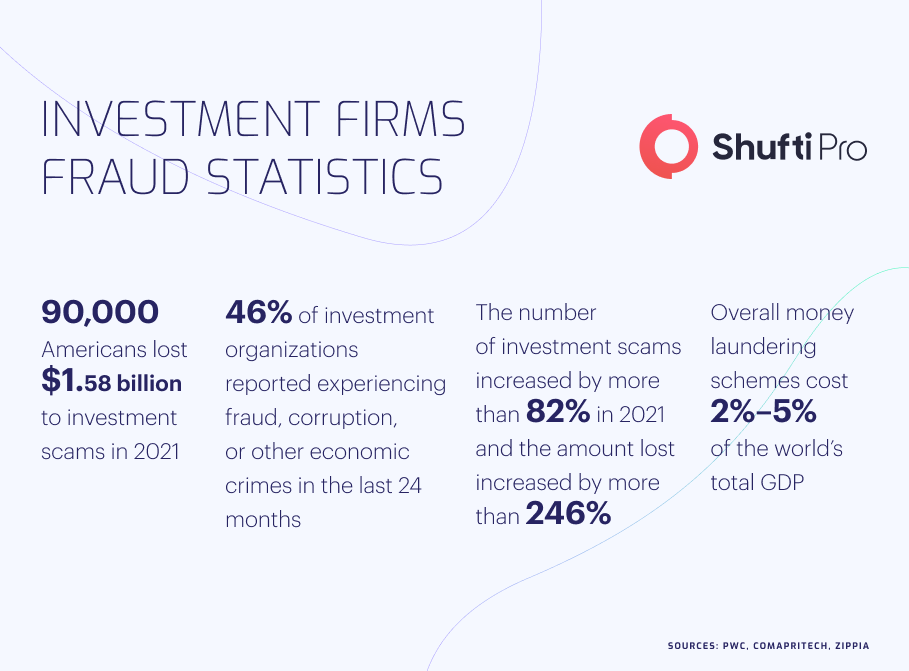Restricting Criminals from Exploiting Investment Industry with Shufti AML Screening Solution

Investing the accumulated capital of investors in financial securities is the primary task of investment companies. Emerging technology and a huge influx of money in this sector have led criminals to use advanced methods to carry out money laundering and other financial crimes. Investment firms in the whole world have become a potential target for scammers and crime statistics are skyrocketing every year. Not verifying the identities and source of income of investors while onboarding is the major reason behind fraud which must be addressed to curb investment scams.
In the UK alone, investment fraud is rising by 42% every year driven by a 59% increase in Ponzi schemes and 57% in bond sale scams. Although all countries and organizations across the globe have implemented stringent measures to monitor investment firms, scams are still prevailing. All these companies are in dire need of viable identity verification and anti-money laundering solutions through which the true identities of investors can be verified and get them screened against AML sanction lists.
Money Laundering Risks for Investment Companies
Since 9/11, money laundering has become a global concern contributing to terror financing and other heinous crimes. Due to strict security measures adopted by banks, criminals have found their way through investment firms, increasing the overall crime rate. The primary reason for these rising numbers is the absence of identity verification and anti-money laundering checks which are not only resulting in financial losses but also discouraging sophisticated investors. Undetected crimes in the investment sector are encouraging bad actors to operate without any risks further intensifying the crime ratio.
With the introduction of cryptocurrency in digital economy, investors have found another platform to invest and earn money but it is also prone to financial scams as well. In 2021 alone, people have lost $1 billion to crypto fraud making it a highly vulnerable platform for investment. With transforming technology, it is imperative for companies to implement anti-money laundering solutions to avoid the risks posed by financial criminals.

Money Laundering Cases in Investment Firms
High risks of money laundering through the investment sector have compelled key stakeholders to take strict measures against criminals. It has led global organizations and major jurisdictions to legislate laws for investment firms resulting in several cases of punishments for the culprits.
British Companies under Investigation for Laundering $820 Million
British law enforcement authorities have recently started investigation of 13 investment companies that were involved in money laundering of $820 million out of Russia to the UK. All these 13 companies were running several shell companies and helping Russian money launderers to invest illicit funds and turning into legal assets.
It has been investigated so far that Russian beneficiaries of this case include several political figures. British court has ordered a further investigation to trace all the transactions involved in the case before announcing the verdict.
European Police take down $22m Crypto Investment Fraud
European police have recently conducted a raid on a gang involved in cryptocurrency investment fraud. There are multiple companies involved in scam defrauding victims of at least $22 million operating in various countries across Europe. The investigation found that criminals were working through a fake crypto coin and convincing the investors to invest money and get profits. The victims mainly belong to Germany, Finland, Latvia, and Netherlands. Investigations are still going on and culprits are yet to penalize by the court.
Prominent Regulations across the Globe For Investment Industry
Regulatory authorities and businesses have highlighted the risks of money laundering, terror financing, and defrauding schemes in the investment sector. Based on alarming statistics, global watchdogs and affected countries have started working to monitor investment firms by making laws and running awareness drives. The role of FATF, US, UK, and Australia is quite commendable which have formulated strict laws to curb money laundering using investment companies.
Australian Securities and Investments Commission Act
The Australian Transactions Report and Analysis Center (AUSTRAC) is the primary legislative body governing money laundering through investment firms. AUSTRAC is working under the guidelines of the Australian Securities and Investments Commission ACT and AML/CFT Act 2006 to implement strategies to counter risks of money laundering.
Like the banking sector, AUSTRAC has proposed AML/CFT measures for investment sector and regularizes all the transactions. It has further recommended implementing an identity verification solution to verify the true identities of investors and their source of income.
FATF’s Recommendations
The Financial Action Task Force (FATF) is the primary international organization working tirelessly to eradicate money laundering from all financial organizations. FATF has termed investment sector highly prone to the risks of identity theft and money laundering and issued comprehensive guidelines to monitor financial transactions involved in the business.
It has been mandatory for all countries to implement identity verification and AML screening solutions in the investment sector to eliminate money laundering and terror financing. FATF has moved further and placed several countries on the grey and black lists for not complying with the guidelines.
Sixth Anti-Money Laundering Directive (6th-AMLD)
6th AMLD passed by European Union (EU) has directed all the member-states to implement strict measures against money laundering. It has been recommended to all countries implement a Risk-Based Approach (RBA) in investment firms to counter money laundering and terror financing. Moreover, the need for an electronic identification mechanism has also been highlighted to verify the true identities of investors.
Customer Due Diligence and AML Compliance for Investment Firms
The whole investment sector is built on reliance and people need to trust companies to invest funds. Scams in the investment sector are not only causing financial losses but also exploiting the users’ experience. Customer Due Diligence (CDD) is a process that must be made part of investment companies to cope with the existing challenges. Through CDD, basic information about the investor and source of income can be checked periodically to verify the true identities. CDD procedures are quite crucial to comply with the global and regional AML guidelines.
To add to it, money laundering has become another huge threat to the financial system which is not only causing monetary losses but also giving heat to terrorism. It is need of the hour to implement stringent AML checks in the investment sector to counter all the bad actors. Global organizations particularly FATF and Interpol have accumulated huge data in the form of sanctions and Political Exposed Persons (PEP) lists which must be taken into account while onboarding new investors. By following this principle, the investment sector can be made secure for sophisticated investors.
How Shufti can Help?
Despite all the global regulations and efforts by investment companies, financial crimes are still prevailing in system damaging the reputation of the investment industry. The only viable solution for investment firms is the implementation of identity verification and AML screening solutions. Shufti’s state-of-the-art IDV and AML screening services can help investment firms stay compliant with international regulations. By incorporating these solutions, investment companies can identify the true identities of investors and report any suspicious activity.
Shufti’s AML screening solution has access to 1700+ global watchlists and screen data against them to verify the track record of investors. Powered by thousands of AI algorithms, Shufti’s AML solutions provide output in less than a second with 98.67% accuracy.
Want to know more about IDV/AML screening solutions for investment firms?

 Explore Now
Explore Now













